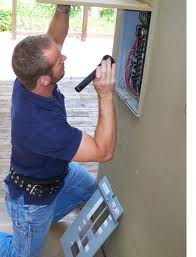Archive for the ‘fixer-upper business’ Category
Thursday, April 5th, 2012

The fixer-upper house business is a great business to be in these days. But, if you are just starting out, and are as green as a gourd, as I was, you need some help.
To speed up the learning processes, you need to have a collection of reference books on home repair, buying and selling houses, rental properties, tax law and all other aspects of real estate.
If a home without books is like a body without a soul, then a fixer-upper business without reference books is like a cook without a cookbook.
You may not know everything at the start of your new business and you may need help in some areas, especially in the initial stages. However, each time you pay to have someone do work for you, or go through some new process, you should observe everything, ask questions and learn the process.
That way, the next time you will be able to do it yourself, or at least perform a larger part of the project. The key is to keep doing things over and over until you master how it works. You will eventually reach a point where you make decisions of where to make repairs and which houses to buy based on your instinct.
Books will help you to reach that point sooner.
Here are some books that I have found particularly useful to have on hand:
1. Fix em Up, Rent em Out, by yours truly. Yes, believe it or not, I read my own book! Anyone who says otherwise, is just itching for a fight.
2. Investing in Fixer Uppers, by Jay DeCima. His first, and still my favorite, of his books.
3. Investing in Real Estate, by Gary Eldred.
4. Arizona Landlord’s Deskbook (or the equivalent for your state.) by Carlton Casler.
5. Real Estate Debt Can Make You Rich, by Steve Dexter.
6. Wiring 1-2-3, by Home Depot
7. Plumbing 1-2-3, by Home Depot
8. Tiling 1-2-3, by Home Depot. Are you getting the impression that I like the Home Depot books? In addition to mastering the art of tile installation, I made my first grout repair after reading this book.
9. Fix it Yourself Manual, by Reader’s Digest.
10. Upside Up Real Estate Investing, by Bob Zachmeier (teacher of the first real estate class that I took).
Tags:Fix em Up Rent em Out, fixer upper houses, investing in fixer upper houses, investing in real estate, real estate books, upside up real estate investing
Posted in Fix em Up Rent em Out, Fixer Jay, fixer upper book, fixer upper houses, fixer uppers, fixer-upper business, how I got started in fixer uppers, how to make money renting housing, how to start a real estate business, How to start your own house fix up and rental busines, investing book, investing in your spare time, real estat investing, real estate books, real estate investing, rental house improvements, repair books, repairing properties, repairing rental houses, reviewing books and records, turn my home into a rental, Upside Up | 13 Comments »
Wednesday, March 28th, 2012

Learn the Ropes
My wife and I didn’t know much about repairing houses before we started our fixer-upper business, but like fine wine, we got better as time went on. One important rule in the fix-up profession is that you must constantly strive to become self-sufficient and learn all aspects of the profession. You must become an expert in your new business, even if you only do it part-time.
You can learn from others, but you have to rely on yourself to get ahead. Like the novice swimmer who is tossed in the pool, sometimes it’s sink or swim. You must learn by doing.
Trust Your Own Judgment
There are times when destiny forces you down a certain path in life. Other times, you make you own destiny by choosing to walk down a difficult path.
My plan when I bought my first fix-up house was that I could learn as I went along. I thought if others had learned to do it, so could I.
When I bought my fist fix-up house, it was like being stranded on a desert island. I was forced to learn new skills to survive, like Robinson Crusoe. The best way to learn new skills is by putting yourself in a situation where you are forced to change and adapt.
Before embarking on his life-transforming mission, the hero in the book Dune was advised, “Unless you change, something inside you sleeps.”
Foreclosure Update
The bank accepted someone else’s bid over mine for the foreclosed property that I bid on. My new target property is a 3 bed, 3 bath townhouse that is being offered for $69,900.

In this market, persistance is the name of the game. You just have to keep looking and keep bidding until you land a property at the price you desire.
Related Posts
Tags:Dune, fixer upper houses, forclosures, learn as you go, rental houses, Robinson Crusoe
Posted in fixer upper houses, fixer uppers, fixer-upper business, fixing rental houses, foreclosures, how I got started in fixer uppers, investing financial independence, investing in real estate, investing in your spare time, investment house, investment property, investmet properties, rental properties, rental property, repairing properties, repairing rental houses, Uncategorized | 10 Comments »
Wednesday, March 7th, 2012

As we operate our fixer upper and rental house businesses, its always good to do things that contribute to our positive attitude and keep our spirits up.
My wife and I were watching the movie the “Peaceful Warrior” Saturday night, and I was really inspired by the movie.
In a nutshell, one night when a gymnast, Dan Millman, cannot sleep he wanders in to a service station and meets a mysterious man. Dan injures his leg in an automobile accident and the mystic helps the gymnast to overcome incredible odds and tap into new worlds of strength and understanding. Here’s one of my favorite scenes as Socrates teaches Dan a valuable lesson.
Dan Millman: Life has just three rules?
Socrates: And you already know them…
Dan: Paradox, humor, and change.
Socrates: Paradox…
Dan: Life is a mystery. Don’t waste time trying to figure it out.
Socrates: Humor…
Dan: Keep a sense of humor, especially about yourself. It is a strength beyond all measure.
Socrates: Change…
Dan: Know that nothing stays the same.
At the end of the film, Dan is trying out for the Olympics, after making a startling comeback from his accident. A teammate asks him if can share some tip that he has learned from his training with Socrates to help him do his routine. Dan tells him to get rid of the garbage in his mind, to just forget about winning and his parent’s expectations, and to just focus on the routine.
But, the teammate just doesn’t get it. He replies that he has to win the gold medal, and everyone is counting on him to win. If he loses, he will let himself, and everyone else down, and he’ll never be happy.
What’s really interesting is the expression on Dan’s face as he listens to his teammate, and his realization that he used to think exactly the same way.
How this relates to fixer-upper houses
The movie made me think about how the fixer-upper business is like being a peaceful warrior. The Peaceful Warrior said, “Service to others is the highest good.”
I don’t think its stretching things too far to say that we provide a service. We purchase properties that are worn out and shunned by society. We rehabilitate the houses, make them presentable again, and provide a nice place for people to live in.
Related Posts
Tags:Dan Millman, fixer upper houses, it's the journey not the destination, life has three rules paradox humor and change, peaceful warrior, service to others is the highest good, Socrates
Posted in do it yourself, Fix em Up Rent em Out, fixer upper houses, fixer-upper business, foreclosures, invest real estate repai and sell or rent, investing in real estate, investing in your spare time, investment house, investment property, investments, investmet properties | No Comments »
Monday, February 27th, 2012

The past several months I have been searching for another investment/rental property to purchase, and have so far come up empty. Several times I found one, only to have it sold before I got my bid in. Today, I got my bid in on the above pictured foreclosure house. There are four bids on it and the bank will select one of us sometime this week.
The house is 3 bedroom, 1 bath, 1,400 sq ft, property in a nice neighborhood. The price is $53,000. It needs somewhere between $5,000 – $10,000 work to bring it up to rental condition, e.g., replacing sheet rock, electrical work, roof work, and flooring. It sold for $149,000 in 2006. I should be able to rent it for around $800/month. I’ll purchase with cash, if I get the house.
I would have preferred 2 bathrooms, but the house is in a good location and is otherwise a pretty good deal. I know several people with children who only have one bathroom and it works for them, even though I’m used to two.
Now is the time to take action
If you are just sitting on the fence, now is an opportune time to get into a investment house.
Of course, you must conduct a good inspection of the property either before you make the offer, or during the 7 to 10 day inspection period after your bid is accepted. Usually there are is no history of the property for you to examine, on foreclosures. It’s sold as is.
My main motivation is to that I can fairly inexpensively purchase a rental house, and it will provide me with an unusually large stream of income. I have other rental houses, but this new one will produce much more revenue because most of my income on the other properties goes to pay the mortgage company. Since I’m able to pay cash, this time all the revenue goes to me.
Rentals better than pensions
The great advantage of owning real estate property over having a pension is that your pension is fixed and what you get when you start it, is all you will ever get. For rental houses, the amount you receive from tenants goes up over time, with inflation, and you can never use it up.
The double win
It’s like being able to bet your money in Las Vegas, but then you get all the money that you lost back again when you leave. You get the monthly payments, like a pension. But, if you ever want to sell your investment house, you get the entire amount that you spent back again, and usually a lot more than that.
OTHER BLOG ARTICLES:
I encourage you to check out the insightful article How do you handle the whining tenants? over at landlordinvestor.com.
Tags:buying foreclosed houses, Fix em Up Rent em Out, foreclosure, maximizing profits with rentals, pension v rental
Posted in fixer upper houses, fixer-upper business, foreclosures, housing market, how to make money renting housing, inspections, learn repair skills, learn to invest in real estate, real estate investing, real estate principles, rental house improvements, Uncategorized | 2 Comments »
Monday, February 20th, 2012

Are you like me and never socked much money away for retirement? We are not alone. The Employee Benefit Research Institute’s Annual Retirement Confidence Survey found that pre-retirees (Americans between the ages of 55 and 65) greatly underestimate how long they are likely to live and how much money they will need in retirement.
Experts say that we need to change our mindset from “assets” to “income” in retirement planning. It’s not enough to know how much money we have in savings; we need to know how much income our savings can generate over time.
There is no better way to change our mindset and our portfolio from “assets” to “income” than by investing in real estate. If we invest wisely before we retire, and can have a stable of reliable rental properties that generate steady monthly income. We can look forward to a retirement that provides security instead of uncertainty.

Don’t rely on politicians to provide you with retirement security. If you want it done right, you must do it yourself.
Related Posts
Tags:rental house, rental property, renting properties, retirement with real estate
Posted in buyer's market, buying real estate, create wealth in real estate, Fix em Up Rent em Out, fix up houses, fixer upper houses, fixer uppers, fixer-upper business, how I got started in fixer uppers, how to make money renting housing, how to start a real estate business, How to start your own house fix up and rental busines, invest real estate repai and sell or rent, investing financial independence, investing in real estate, investing in your spare time, investment house, investment property, investments, investmet properties, learn to invest in real estate, lower home prices, real estat investing, real estate debt, real estate debt can make you rich, real estate investing, real estate principles, recession and real estate, rental properties, rental property, rentals, retirement, safe ways to invest in real estate, small investor, start small, Uncategorized | 3 Comments »
Wednesday, February 8th, 2012

Go confidently in the direction of your dreams. Live the life you have imagined.
— Henry David Thoreau
While you pay a price for following your dream, you also pay a price for staying where you are. You lose the opportunity to develop new life-coping skills that help you deal with unexpected crises or joblessness. You may suffer from depression by staying in a debilitating job.
Marsha Sinetar, in To Build the Life You Want, Create the Work You Love, says that excelling at a job that you love could be the best mental health insurance for people who feel depressed or anxious about their work. Americans spend $12.4 billion each year to treat clinical depression.
Do You Have Zest and Gusto?
Science fiction writer Ray Bradbury, in Zen and the Art of Writing, wrote that, “life is short, misery sure, and mortality certain.” Yet, he advocated that as we move along life’s way, and in our work, our lives should be filled with “zest” and “gusto.” With zest and gusto, traveling to the grave, Bradbury vowed to fight injustice, appreciate beauty and encourage children.
Is there enough zest and gusto in your life to fight in-justice, appreciate beauty and encourage children?
What do You Trade Your “Life Energy” For?
We should wisely use the time that we must devote to work. Our working hours constitute at least one-third of our lives during the work week. As Joe Dominguez and Vicki Robin point out in Your Money or Your Life, money is what we chose to trade our time, or “life-energy,” for. The authors distinguish between “wants” vs. “needs,” and promote not wasting money on unnecessary consumer goods. Instead, they advocate conscientiously saving money until you reach the point where you can free yourself from the working treadmill.
Fixer Upper Houses was Right for Me
The independence of working with fix-up houses was this type of “right” job for me, and can be for you too. It can be the road to operate a business that develops one’s independence, creativity and imagination. With real estate, you can invest a small amount and gradually accumulate money as both your rental income and equity increase over time.
Video of TV Interview for “Carve Out Your Niche”
Related Posts
Tags:Built the Life you Want, Create the Work You Love, fixer upper houses, follow your dream, Joe Dominguez and Vicki Robin, Marsha Sinetar, Ray Bradbury, Thoreau, Your Money or your life, Zen and the Art of Writing
Posted in fixer upper book, fixer-upper business, fixing rental houses, overcoming obstacles, streams of income | 5 Comments »
Saturday, January 28th, 2012

Although I used my handyman friend to inspect the first fixer upper house that I bought, in later houses I hired a professional property inspector to go through the house and to provide me with a complete inspection report.
The Value of the Inspector’s Report
The inspector’s report can be used to help you negotiate a lower price on the house if they uncover anything in the house that is in need of repair. Hiring a qualified property inspector is a good way to make sure that you are really getting what you pay for in a house.
Due Diligence Allows You to Correct Deficiencies
Once you have made an offer on a house and it had been accepted by the seller, the “due diligence” period begins and you have until the close of escrow (or completion of the sale) to check out the physical and financial condition of the property. If you discover that the property has problems, but you think the deal is still worth pursuing, the seller may be willing to correct any deficiencies, or give you money to complete the necessary work yourself.
Two Key Components of Due Diligence
There are two key components of due diligence process:
1. Review of books and records
In my case, there are usually no records to review. Most of the houses that I buy have been fixer-uppers repossessed by a bank, the Veterans Administration or HUD, and the owner is long gone.
2. The physical inspection
When there is no owner present this makes the physical inspection all the more important.
The due diligence period is your last opportunity to either:
1.) complete the transaction, or
2.) cancel the escrow, have your money returned, and look for another property.
“Carve Out Your Niche” TV Interview Monday
Tags:buying fixer upper houses, due diligence, property inspection
Posted in carve out your niche, Fix em Up Rent em Out, fix up houses, fixer upper book, fixer upper houses, fixer uppers, fixer-upper business, property damage, property inspection, property protection plan | 6 Comments »
Tuesday, January 24th, 2012

Most people only re-examine the path that their life is taking when they suffer a traumatic experience. Some people take a deep breath when they reach a point where they realize that their days are numbered. They sense the need to focus the remainder of their lives on doing something that provides a deeper satisfaction and allows them to spend more time with their family. For others, they realize that they don’t want to continue to work at a mind-numbing job or for an ungrateful boss.
There is more to life than just making money. Henry David Thoreau said, “Most men live lives of quiet desperation.” We long for something more fulfilling.
I advocate investing your time and psychic energy in fix-up houses (and in writing books). You will find more meaning in life, grow as a person, and make money independently of your regular job.
Taking a new path toward earning money requires us “to give up what is familiar and secure,” as Marsha Sinetar says in her book Do What You Love and the Money Will Fol-low. Sinetar feels that working at the “right” job involves “doing our best at what we do best.” Sinetar suggests that we periodically take stock of our true life’s purpose by asking the following questions:
1. What do I want to have accomplished when I look back upon my life in old age?
2. What habits would I need to cultivate and what would I have to delete from my present life to live out my true purpose?
3. What activities would I do if I lived as if my purpose meant something to me?
See also:
Do the Opposite of Everyone Else
* * *
Tags:do what you love and the money will follow, Fix em Up Rent em Out, fix up houses, investing in fixer uppers, Marsha Sinetar, Ralph Waldo Emerson
Posted in buying fixing renting rehabs, Control Your Thoughts, create wealth in real estate, do it yourself, fixer upper houses, fixer uppers, fixer-upper business, How to start your own house fix up and rental busines, learn to invest in real estate, multiple careers, On Person - Multiple Careers, small investor, streams of income, success | 3 Comments »
Wednesday, December 28th, 2011
This is your way to verify that the impressions you have of your applicants are true. Everyone who wants to rent my house has to fill out an application form. I will select usually the top one or two candidates, based on the processes mentioned above, and then call all the references and former landlords listed on the application form.
Always try to verify the references by telephone. You wouldn’t be the first landlord to be given a fake reference, and people will often give more candid opinions when you speak to them.
I don’t run credit checks, but I do like to see copies of their paychecks. I do a criminal background check by searching county court house records, and I check the sex offender’s registry list.
A high priority for me is that they make enough money to pay the rent. Don’t go by what they say; go by what their paycheck says.
They may say, “So anyway, my wife/girlfriend is going to get a job in a couple of weeks, and we operate a successful E-bay business, so the rental payments won’t be a problem.” Weeks turn into years and all the while they will have trouble making their monthly payments. Someone who has a stable, good paying job is an ideal tenant.
3 Books that Changed My Life
Are You Big Enough to Pay it Forward?
Tags:backgrou;nd checks, managing tenants, rental houses
Posted in Fix em Up Rent em Out, fixer upper houses, fixer-upper business, for rent, managing tenants, tenants | 4 Comments »
Wednesday, July 6th, 2011

Govern a great nation as you would cook a small fish. Do not overdo it.
–Lao Tzu
A key to fixing up a house is to know when to stop fixing up. You want the house to look good, yet you know that people are not going to care for your house the same way that you would. For rental properties, I don’t purchase the most costly, or even new, materials. I do a lot of my shopping at stores that recycle construction materials, like Habitat for Humanity’s Re-stores. You can get bargain basement prices on things like doors, kitchen cabinets, hinges, toilets, paint.
Need I say more? It’s a fixer-upper person’s paradise.
If I know that I am going to sell the house I may install higher grade of materials, especially where it really counts, like the kitchens and bathrooms. As Lawrence Dworin says in Profits in Buying & Renovating Homes:
“It’s easy to get carried away on renovation projects – wasting time and money on repairs that buyers won’t pay extra for. I assume you like to do good work. We all do. And we’d like every finished project to be a showplace. But you can’t make money that way. Your buyers have a limit on what they’re willing to pay. That’s why you’ve got to limit repair costs. In this business, you concentrate on fixing code violations and creating a clean, safe, livable house.”
Related Posts
Tags:Fix em Up Rent em Out, fixer upper houses, Habitat for Humanity, Lao Tzu, Lawrence Dworin, Profits in Buying & Renovating Homes, Re-store, rental houses, Terrry Sprouse
Posted in fix up houses, fixer upper houses, fixer-upper business, for rent, house repair, house repairs, how to make money renting housing, rental house improvements, rental properties, repair, repairing properties, repairing rental houses, repairs | 3 Comments »















